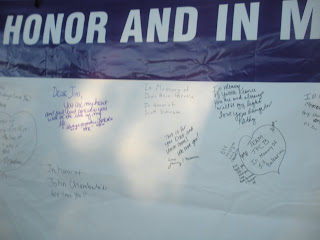"Stand Up To Cancer" research funds raised by ABC, CBS, NBC telecast last fall.
A TV industry- and celebrity-driven cancer research project has chosen scientists at Johns Hopkins for two of five multi-institutional "dream teams" financed by "Stand Up To Cancer" grants totaling more than $6 million.
The grants, established by the Entertainment Industry Foundation, are funded with $73.6 million raised during a simultaneous, primetime, television broadcast on ABC, CBS, and NBC television networks last September.
Two awards to Johns Hopkins- led teams were chosen by a 20-member panel of scientists, physicians and patient advocates who reviewed 237 applications.
The Johns Hopkins research will focus on pancreatic cancer and epigenetics, a relatively new field of research directed at understanding and manipulating gene alterations that can shut down natural cancer protection.
Stephen Baylin, M.D., deputy director of the Sidney Kimmel Comprehensive Cancer at Johns Hopkins, will co-lead with Peter A. Jones, Ph.D., D.Sc., director of the University of Southern California/Norris Comprehensive Cancer Center a $9.12 million, three-year grant to study epigenetic changes that modify the way a cell packages its DNA sequence for regulating gene function. Abnormal DNA packaging silences genes that confer cancer protection in people with lung, breast and colon cancers. The Johns Hopkins-USC-led Dream Team will conduct legal trials and laboratory investigations to test potential treatments to reverse this silencing of genes.
"We will be looking for signatures in the genomes of tumor cells from patients with leukemia, lung, breast and colon cancer that can predict whether cancers in certain patients are susceptible to these therapies," says Baylin, who is the Virginia & D.K. Ludwig Professor in Cancer Research. "Tracking the signatures can also help monitor patients' response to the drug."
Johns Hopkins scientists will receive approximately $3 million for its portion of the epigenetics grant. Other institutions in the epigenetics dream team are the University of Pittsburgh, the University of Texas MD Anderson Cancer Center, and the Lovelace Respiratory Research Institute at the University of New Mexico. Johns Hopkins team members are: Nita Ahuja, M.D., Nilofer Azad, M.D., Malcolm Brock, M.D., Robert Casero, Jr., Ph.D., Leslie Cope, Ph.D., Edward Gabrielson, M.D., James Herman, M.D., Rosalyn Juergens, M.D., William Matsui, M.D., Charles Rudin, M.D., Ph.D., Vared Stearns, M.D., Jeff Wang, Ph.D., and Cynthia Zahnow, Ph.D.
For pancreatic cancer research, scientists at Johns Hopkins will be awarded $3.75 million in Stand Up to Cancer grants, plus clinical trial funding from the $18 million grant led by Craig Thompson, M.D., director of the Abramson Cancer Center at the University of Pennsylvania and Daniel Von Hoff. M.D., physician-in-chief and director of the Clinical Translational Research Division at the Translational Genomics Research Institute (TGen) and Chief Scientific Officer at Scottsdale Healthcare.
Johns Hopkins investigators will use their funds to test and develop drugs that target faulty enzymes that process glutamine and glucose and fatty acids in some pancreatic cancers. "There are some drugs already approved for diabetic management that have evidence of antitumor effects," says Chi Dang, M.D., Ph.D., vice dean for research at the Johns Hopkins University School of Medicine and advisor for the Sol Goldman Pancreatic Cancer Research Center at Johns Hopkins. "These drugs could be combined with other therapies currently being tested for pancreatic cancer."
In addition to Dang, the pancreatic cancer research team includes Manuel Hidalgo, M.D., Ph.D., Ralph Hruban, M.D., Kenneth Kinzler, Ph.D., Daniel Laheru, M.D., Anirban Maitra, M.D., Martin Pomper, M.D., Ph.D., and Victor Velculescu, M.D., Ph.D., from the Sol Goldman Pancreatic Cancer Research Center at Johns Hopkins, and David L. Vander Jagt, Ph.D. of the University of New Mexico.
Velculescu and Kinzler at Johns Hopkins will scan patients' genomes for genes that could benefit from glutamine and glucose-blocking drugs. Hidalgo and Maitra plan to track drug response. "We also will be looking for experimental drugs, not currently FDA-approved, which could have the same blocking effect on glucose and glutamine metabolism," says Dang, professor of medicine, cell biology, oncology and pathology.
On the web:
videos of Baylin and Dang available at: www.hopkinskimmelcancercenter.org
SU2C press kit: www.su2c.org













